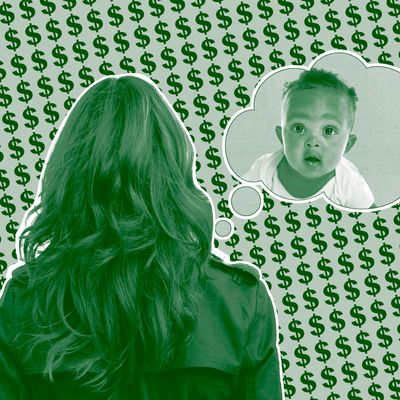
Perhaps you’ve heard: Having a kid is costly. Crushingly so, in some cases. A few years ago, a widely shared report projected that American parents would spend an average of $233,610 (!) to raise a child, illustrated with menacing graphics of toddlers wielding spatulas. A more recent survey found that the average American family spends about $22,000 during a baby’s first year on child-related expenses like day care, diapers, and other supplies. It also found that parents underestimated their first-year baby expenses by 37 percent, on average. No wonder the number of adults who choose to remain childless is rising, and 36 percent of them cited “can’t afford to raise a child” as a major reason for their decision.
Scary numbers aside, it’s impossible to put an exact price tag on kids. But planning for one doesn’t have to be a mysterious black box, either. If you’re worried that parenthood isn’t an option because of amorphous financial anxiety, it’s worth examining the numbers more closely and considering how they might fit into your life.
There’s no tidy solution, and it isn’t just about making or saving “enough” money, says Valerie Rivera, a certified financial planner and founder of FirstGen Wealth, which focuses on helping clients break generational barriers to gaining financial security. Instead, she encourages her clients to plan out their expenses and think about changes they’re willing to make. Amy Rosenow, a certified financial adviser and founder of Fearless Financial, agrees that it’s better to break down the process into questions and steps that make it more accessible. Here’s what they recommend.
.
Think about when you want to start a family.
“Understanding your timeline can help you reverse-engineer what you need to adjust to make it happen,” says Rivera. “Some people say that their timing depends on their finances or their career trajectory. Others might want to have a baby as soon as possible. Or in some cases, the discussion is about preparing to freeze eggs or do IVF.” If you’re not sure, that’s okay too. But having a general idea of timing is an important first step.
One thing Rivera cautions against: thinking you have to be a homeowner before you have a baby. “That’s the biggest checkbox you don’t have to hit. If anything, please wait,” she says. “You really can’t anticipate what your life will look like when you become a parent. If possible, it’s better to rent so that you have more flexibility.”
.
If you have a partner, start talking about how you want to parent together — and research what the numbers look like.
That might seem obvious, but you’d be surprised how often couples blow past this step, says Rosenow. She recently compiled a list of questions — some financial, some not — to start discussing with your partner before you have kids. Keep the emphasis on discuss, because your answers will evolve and you should be open to having a difference of opinion. For example: What aspects of your own childhood would you love to pass along or re-create for your own kids? Conversely, what would you like to spare your kids from if you could? What are your expectations for spending time together as a family — how often do you want to eat dinner together, and how often do you want to take vacations together? What will a typical day’s schedule look like? How might these answers affect your income and spending priorities?
More logistical food for thought: Where do you want to live? Do you prefer a city or suburbs? Do you have strong feelings about renting or owning? Do you have family nearby who will help with child care? Will you both work? If not, who will stay home and for how long? How will you feel about it?
College is another consideration. You don’t need to make decisions about higher education before your baby is even born, but opening a 529 plan and telling relatives and loved ones about it (should they want to contribute) certainly never hurts. Even if your kid doesn’t go to college, 529 funds can often be used to pay for other forms of education, too, including private school and some training programs.
.
Think about what support you have — and what your child care will look like.
Another prompt from Rosenow: If you do plan on using child care, do you want to do day care, or a nanny, or a nanny share, or rely on help from family? How much will all of the above cost?
These questions might seem daunting. You won’t know all the answers, and you will both need to make concessions. But mapping out a plan more broadly will help you figure out what other information you will need, like the typical rate for different types of child care in your area (ask your parent friends and reach out to day-care facilities to find out), what the schools are like, and other kinds of support you’ll need.
“Also, think about what your community will look like,” says Rivera. Sure, your dad can’t wait to be a grandpa, but does that mean he’s committed to picking up your kid from day care three times a week? “Don’t just assume that your support system will be there — talk to people who you’re hoping will assist in some capacity and find out what they are willing and able to do,” she says.
.
Add up your baby budget.
In general, there are three types of baby expenses: gear (one-time purchases like a stroller, a baby carrier, a crib, and a car seat), supplies (ongoing expenses like diapers and formula), and services (child care and health care).
In my personal experience, as a mom to a 3-year-old, the first category — gear — is where you can cut corners the most. Almost all of my son’s clothes and other stuff are hand-me-downs. The key is to find another parent with a kid who was born one to two years ahead of yours; they will be dying to offload things they don’t use anymore. You can find barely used bottles and even breast pumps and maternity clothes on local parents’ groups and Facebook marketplace (I’m in those groups; trust me). When in doubt, don’t buy a lot of stuff in advance — see if you actually need it first.
There will be certain costs that you can’t avoid. Diapers and formula are not cheap. Even if you plan to exclusively breast feed (as I did), factor in paying for formula, because you might really need it (as I also did). As for health care: Rivera recommends that when you’re pregnant or planning to become pregnant, choose a health-insurance policy with the lowest out-of-pocket maximum, and plan to hit it. Your monthly premiums will be higher, but you won’t get any surprise bills, and you’ll likely pay less overall.
Finally, once you add up all your line items and create your “baby budget,” round up generously. You can’t possibly anticipate every cost, and it’s better to be prepared.
.
Give your budget a dry run.
Once you have a rough plan sketched out, test it, says Rivera. “For example, if you want to take a break from work for a year after the baby comes, look at your household budget and see how it goes to live off of one salary instead of two. Or if you’re pregnant, start setting aside what your day care or nanny will cost every month. When you start to execute on it in real life, it helps you understand, All right, we can do this. Or, Maybe we need to make some changes to re-evaluate, or save for another year, to see what this can look like.”
An important note: Having a baby isn’t just plopping a new expense into your existing life structure. It is a total overhaul. I spend a lot on child-related things these days, but I also spend a lot less on other things I used to do, like traveling and eating out and God knows what else I did with so much free time. Most of my social life now revolves around hanging out at friends’ houses or in parks for free. We cook almost all of our meals at home. This might sound sad or boring, but it’s actually quite nice. Someday we’ll hopefully travel more again, but for now, it’s just not in the cards and that’s okay.
.
Don’t aim for perfection — have some faith that you will sort things out.
If you’re reading this, you’re probably going to be okay. “The people who are researching and reading about how to afford kids, and making a plan, I’m confident that they can do it,” says Rivera. “They’re going to be great parents. It’s the people who are like, ‘Whatever happens happens, God will provide,’ whom I worry about.”
What’s more, remember that a lot of these costs are temporary. You’ll only need to buy formula for a year. Your kid will be out of diapers after about two years. By the time they’re 4 or 5, they’ll be in school for most of the day, most of the year, and your child-care expenses won’t be so high. Sure, there will be other things to pay for, but the most costly years of parenting do pass quickly (or so I’m told) and hopefully more smoothly than you fear.
Email your money conundrums to mytwocents@nymag.com (and read our submission terms here.)
More From This Column
- How to Shop Less, According to People Who Love to Shop
- How Much Does It Actually Cost to Give Birth?
- What It’s Like Being a Billionaire’s Personal Assistant





